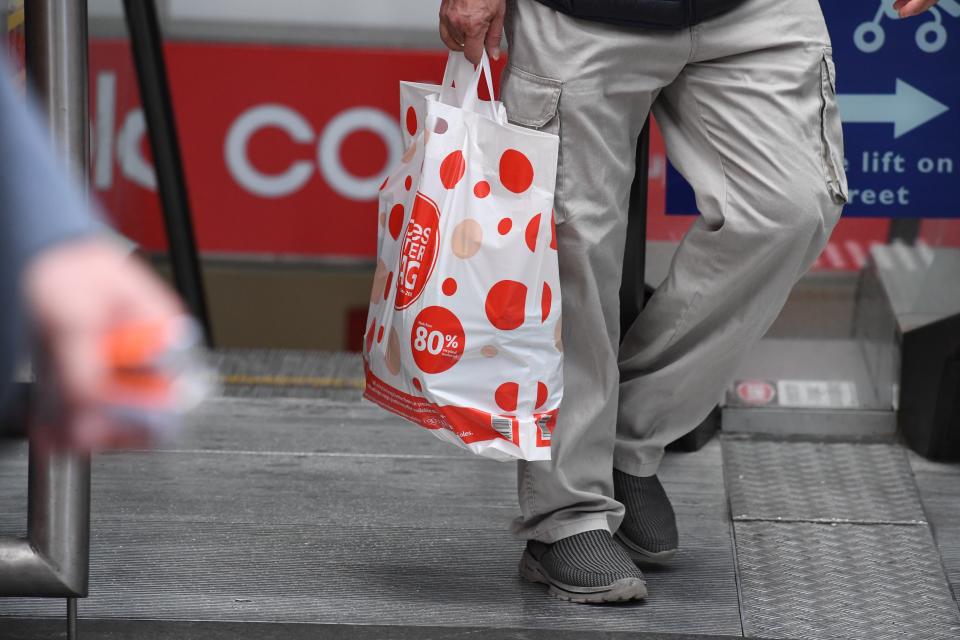'It's likely a failure': Damning household photo reveals plastic bag ban problem
An image of dozens of Coles and Woolworths reusable plastic bags spilling from a kitchen cupboard prompted light-hearted comments from Facebook users when shared earlier this week.
But the photograph is far more concerning than first meets the eye.
The image’s caption was a damning contribution to growing concern the introduction of reusable plastic bags across Australia’s leading supermarkets is ultimately failing.
“Only used once,” the tongue-in-cheek post, asking for $450 for the lot, worryingly read.
“Getting rid due to lack of space for more Woolies bags.”
And the individual from Sydney wasn’t alone.

Many took to the image to tag friends alongside multiple laughing emojis.
More than 350 users hit Facebook’s laughing reaction.
The image was clearly resonating with people who too had similar scenarios inside their cupboards.
“Looks like under our sink,” one person said in a comment that was almost identical to dozens more scattered throughout the comments section.
Such a response is somewhat concerning and begs the question are there fewer bags being used following the removal of single use bags and more importantly is less plastic being sold?
The University of Melbourne’s behaviour change and environmental sustainability expert Geoffrey Binder told Yahoo News Australia it was unlikely.
“I think that we’ll find that certainly when people go shopping there are people who are now taking bags to the supermarket, but does that mean there has been a net decrease in plastic bag use? Probably not.”

Coles, Woolworths silent on sales of reusable bags
Leading supermarkets Coles and Woolworths have been silent on the number of plastic reusable bags they have sold since they removed single use bags from stores nationwide.
When asked by Yahoo News Australia for such statistics, Coles once again declined and Woolworths failed to respond to the request.
Both supermarkets pointed towards the number of single-use bags which were diverted from landfill – a total of 1.7 billion since their removal last year, according to Coles and an impressive 3.2 billion for Woolworths annually.
Yet Dr Binder noted statistics on the sale of other plastic bags was vital in providing transparency on whether the ban had reduced supermarkets’ plastic footprint.
“They’re talking in the billions of [single-use] bags not being distributed so that’s a significant reduction on those, but, of course, the critical question there is what’s happened to the sale of other plastic bags?”
Dr Binder pointed out that those single-use bags had alternative uses for many shoppers, such as being used as bin liners or for cleaning up dog poo.
Removing single-use bags meant shoppers were instead buying other bags to fill those roles – or more worryingly – using the thicker, heavy-duty reusable bags readily available at check-out, which would only worsen the problem.
Viewing the image of the plastic bags spilling from the cupboard, Dr Binder agreed it was most likely a common sight in households across Australia and many shoppers were still treating plastic bags as single-use.

Supermarkets must help shift behaviours
Dr Binder said supermarkets must find solutions to the problem at hand and simply removing single-use plastic bags didn’t do that.
“A ban can be useful but the critical question is what follows? And what strategies are they giving people so their behaviours can transition to something more environmentally sustainable,” he said.
“The problem is when we look to change behaviours on the basis of a causal model, when we look to change behaviour by simply banning something, then it’s going to fail.
“We’ve got to say yes, it’s likely a failure.”
Dr Binder said it was positive that Coles and Woolworths had responded to pressure, but they needed to do more to help customers “strategically modify their behaviours”.
RELATED: Supermarket's 'fantastic' idea to reduce fruit and veg plastic waste
“This was simply the supermarkets responding to pressure to stop distributing free plastic bags and they responded to that pressure,” he said.
“They’re simply taking the line of least resistance. They haven’t thought deeply about the issue. They’re responding to customers and they’ve looked at other jurisdictions where this problem is being managed by putting a small levy on a heavier plastic bag and going, ‘Okay that’ll do.’”
Dr Binder pointed to Victoria’s “extremely successful” Target 155 campaign to reduce people’s daily water usage to 155 litres as a good example of how to implement such a change where the government “simply told people how to do it”.
Do you have a story tip? Email: newsroomau@yahoonews.com.
You can also follow us on Facebook, download the Yahoo News app from iTunes or Google Play and stay up to date with the latest news with Yahoo’s daily newsletter. Sign up here.



